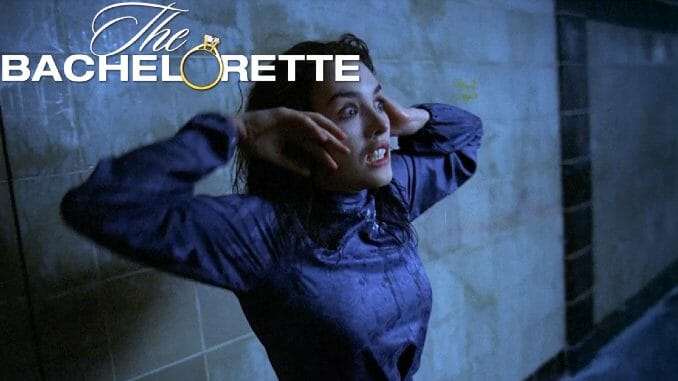Possession and The Bachelorette: A Study on the Horrific Making of Men

It may shock you to read the title of this piece. It may puzzle you. It may just utterly confound you. I wouldn’t blame you if it did. But I implore you to let me explain myself, which I guess you’re going to do, because you’re here, right? You want to know exactly what Andrzej Zulawski’s 1981 horror-drama masterpiece Possession could possibly have to do with that ABC dating reality series The Bachelorette. Like, that must be a typo, right? I’m here to tell you that it’s not, and that the divorce-drama/monster-movie is the blueprint, the prototype for the cyclical hell that is dating reality television. It all comes down to Isabelle Adjani’s lead, Anna, and her desire to build the perfect man. Hell, in another universe, in another time, she’d be a perfect leading lady for the ABC series thanks to that goal alone.
Possession tells the story of Anna, who starts displaying increasingly erratic behavior after asking her husband, Mark (Sam Neill), for a divorce when he returns home to Berlin from an espionage job in the United Kingdom. The request brings Mark to his knees with confusion and bruised pride—and it starts what feels like an all-out war between the partners. As audiences watch one of the most incredible portrayals of divorce ever put to film, they also get a sense that something is deeply wrong in Anna’s private life based on her utterly bizarre behaviors—and that what she is hiding is the impetus for her intense desire to separate from Mark. It is revealed that what tore her from him was a recreation of him, a clone of her husband that she had been crafting all along—made, quite literally, from the blood and guts of something seemingly inhuman.
In both film and reality TV, it all starts with the internal life of a woman. These women—our Bachelorettes-to-be—are like most women; they have emotional impulses that push them to play build-a-boy in the same way that Anna did. Mainly, it’s all in the name of dealing with the torturous emotional rollercoaster of breaking up: The bad, the worse, and the incredibly ugly. The demise of a relationship, or in Anna’s case, a marriage, can be hideous. It meshes and molds itself into something horrible, a mass of maggoty membrane and guts and gore from the innermost workings of love and loss. Once a woman signs onto a show like The Bachelorette, all of that blood and pus starts taking shape, and it is not unlike the horrorshow that was Mark’s clone in the incubation stages. To even try to describe the monster of Possession is to do it an injustice, because the visual is just so garish and gruesome and messy and mangled—truly personifying the ugliness of a breakup.
In case you don’t flex your reality TV muscle all that much, a quick Bachelorette primer might be necessary to connect these dots: ABC whisks one eligible babe out to a resort somewhere special where dozens of handsome, single men are waiting to prove to her that they can be husband material, which is usually what she’s looking for. The series relies heavily on orchestrated dates, hometown visits, highly dramatized elimination ceremonies and, above all else, connection. It is inside that structure that the metaphorical monster of which I just spoke—the gross manifestation of a woman’s damaged romantic past—starts forming into something, something our Bachelorettes hope to take with them through their show “journeys.” Ingredients. These women—like Anna—become fixated on an amalgamation of the best parts of crucial, defining past relationships while also obsessing over how things went wrong. Pretty typical. But it is also implicitly what drove Anna to create a clone of Mark, the husband she seemingly hated the very thought of. It’s what drives our Bachelorettes to relinquish their privacy to reality television in the name of love, where they can assume a position of power to pick and choose the traits they want in a man. The only difference here is that monsters and clones aren’t real; the sentiment, however, is kindred.
In the film, Anna talks about “the two sisters of faith and chance” who are mostly found “fighting in the ring” that is her mind. She and our Bachelorettes have similar struggles, visualizing the before (sister faith) and the after (sister chance) of the breakup. The how and the why and the when. The what ifs. “The possibility I’m talking about pierces reality,” she says during a fervent stupor, trying to reason out her own situation with herself. And though she, and these women who set themselves up for heartbreak on reality TV, can be “the maker of her own evil,” the possibility of a better love with all the best parts of the best times pierces reality in a way that warps things. After all, wouldn’t you say going through the entire dating process on national TV, even if entertaining, is a bit warped? That same possibility warps Anna’s judgement, leading her to build a hellish clone instead of, you know, dreaming big and imagining a whole new lover.
-

-

-

-

-

-

-

-

-

-

-

-

-

-

-

-

-

-

-

-

-

-

-

-

-

-

-

-

-

-

-

-

-

-

-

-

-

-

-

-








































